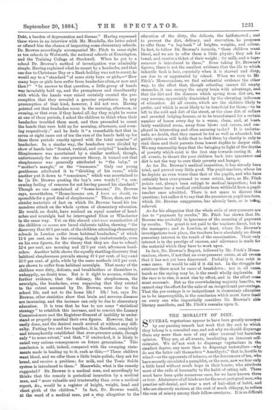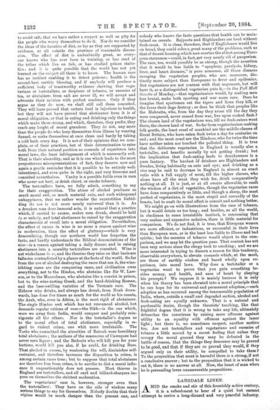THE MORALITY OF DIET.
SEVERAL vegetarians appear to have been greatly annoyed by our passing remark last week that the sect to which they belong is a conceited one, and ask why we should disparage them any more than men of any other unusual but harmless opinion. They are, at all events, inculcating an innocent sea- restraint. We do*not wish to disparage vegetarians in the smallest degree, any more than to disparage teetotallers—why do not the latter call themselves "Amethysts," that is, hostile to wine P—or the opponents of tobacco, or the denouncers of tea, who have recently circulated a pamphlet, or the men, now we fear only a little band without much hope in their hearts, who attribute most of the evils of humanity to the habit of eating salt. These must have been quite numerous once, for we have known three or four. Abstainers of all kinds are for the most part good men, who practise self-denial, and wear a sort of hair-shirt of habit, and who are sincerely anxious, at the cost of much obloquy, to reduce the sum of misery among their fellow-creatures. It is so difficult
to avoid salt, that we have rather a respect as well as pity for the people who worry themselves to do it. Nor do we consider the ideas of the fanatics of diet, so far as they are supported by evidence, at all outside the province of reasonable discus- sion. The effect of diet is undoubtedly great, as every- one knows who has ever been in training, or has read of the tribes which live on fish, or has studied prison statis- tics; and it is quite possible that the world has not yet learned on the subject all there is to know. The human race has no instinct enabling it to detect poisons ; health is the second-best earthly blessing, and if anybody will produce a sufficient body of trustworthy evidence showing that vege- tarians or teetotallers, or despisers of tobacco, or enemies of tea, or abstainers from salt are never ill, we will accept and advocate their opinion with perfect readiness. Only if they argue as they do now, we shall still call them conceited. They will have proved that certain food is injurious to health, but they will not have proved that abstinence from it is of moral obligation, or that in eating and drinking only the things which make them strong, and which, therefore, they prefer, they reach any height of moral grandeur. They do not, any more than the people do who keep themselves from illness by wearing flannel, or make themselves at once clean and hardy by taking a cold bath every day. It is not of their opinions that we com- plain, or of their practices, but of their determination to raise both from their natural position as counsels of experience into moral laws, the least infringement of which is necessarily evil. That is their absurdity, and as it is one which leads to the most preposterous misrepresentations of fact, they deserve now and again a gentle reminder that it is possible to be entirely well- intentioned, and even quite in the right, and very tiresome and conceited nevertheless. Vanity is a possible foible even in men who never eat beef, or drink claret, or smoke tobacco.
The teetotallers have, we fully admit, something to say for their exaggeration. The abuse of alcohol produces so much moral evil, so much material ruin, and such widespread unhappiness, that we rather wonder the superstition forbid- ding its use is not more nearly universal than it is. As a drunken man does immoral acts, it is natural that a practice which, if carried to excess, makes men drank, should be held in se unholy, and total abstinence be raised by the exaggeration characteristic of recoil into a moral obligation. Nevertheless, the effect of excess in wine is no more a reason against wine in moderation, than the effect of gluttony—which is very demoralising, though our northern world has forgotten the facts, and hardly understands the Biblical denunciations of the vice—is a reason against taking a daily dinner, and in raising abstinence into a morality teetotallers are conceited. Wine is not wickedness in se, and the theories they raise on that basis are fallacies contradicted by a glance at the facts of the world. So far from the use of alcohol destroying the races that use it, the wine- bibbing races are the conquering races, and civilisation owes everything, not to the Hindoo, who abstains like Sir W. Law- son, or to the Mussulman, who abstains like a convict in prison, but to the wine-tasting Greek, and the hard-drinking Roman, and the beer-swilling varieties of the Teutonic race. The Hebrew who drinks, and always has drunk, from Noah down- wards, has done five times as much for the world as his cousin, the Arab, who, even in Africa, is the most rigid of abstainers. The single Hindoo sect which has not renounced alcohol, but demands regular rations of rum—the Sikh—is the one which, were we away from India, would conquer and probably rein- vigorate all the others. Nor is the teetotaller's dogma as to the moral effect of total abstinence, especially in re- gard to violent crime, one whit more irrefutable. The Turks who committed the atrocities of Batouk were hereditary total abstainers ; the authors of the massacres of Cawnpore had never seen liquor ; and the Bedouin who will kill you for your buttons, would kill you also, if he could, for drinking Bass. That alcohol in excess, by weakening the will, diminishes self- restraint, and therefore increases the disposition to crime, is among certain races true; but, to suppose that total abstainers are therefore free from crime, is to ascribe to diet a moral influ- ence it unquestionably does not possess. Most thieves in England are teetotallers, and all card and billiard-sharpers im- pose on themselves the strictest moderation.
The vegetarians' case is, however, stronger even than the teetotallers'. They have on the side of wisdom many !tenons things to say for themselves. Nobody doubts that their regime would be much cheaper than the present one, and
nobody who knows the facts questions-that health can be main- tained on cereals. Rajpoots and Highlanders are bred without flesh-meat. It is clear, therefore, that if Englishmen would live on bread, they could solve a great many of the problems, such as that of decent housing, which now overtax the ablest among Euro- pean statesmen—could, in fact, get very nearly rid of pauperism The race, too, would possibly be as strong, though the assertion that it would be less liable to "apoplexy, paralysis, kidney, liver, and heart diseases," is pure nonsense, all those diseases ravaging the vegetarian peoples, who are, moreover, dis- tinctly more subject than Europeans to fever and epidemics. But vegetarians are not content with that argument, but will have it, as a distinguished vegetarian puts it,—in the Pall Mall Gazette of Monday,—that vegetarianism would, by making men less brutal, make both sporting and war more rare. Does he imagine that sportsmen eat the tigers and lions they kill, or the foxes their dogs destroy ; or does he think that peoples like the Mahratta, who, from the day they arose till the day they were conquered, never ceased from war, live upon cooked flesh P The chosen land of the vegetarians was, till we flesh-eaters went there, the chosen land of war. So far from vegetarianism making folk gentle, the least cruel of mankind are the middle-classes of Great Britain, who have eaten flesh twice a day for centuries on end; and the most cruel are the Hindoos, who for twice the time have neither eaten nor touched the polluted thing. It is true that the deliberate vegetarian in England is usually also a teetotaller, and benefits morally by not getting drunk; but the implication that flesh-eating leads to drunkenness is a pure fantasy. The hardest (if drinkers are Highlanders and. Swedes, living habitually on oats and rye; and drinking as a vice may be said to decrease in England in almost an exact ratio with a full supply of meat, till the higher classes, who alone have all the meat they wish for, drink comparatively nothing at all. It is just, or at all events allowable, to exalt the wisdom of a diet of vegetables, though the vegetarian races have done comparatively so little, and though a sheep, the most perfect of vegetarians, is the most stupid and cowardly of the beasts, but to exalt its moral effect is conceit and nothing better.
We might go on with illustrations from the case of tobacco, but it would detain us too long; and besides, as all the world, in obedience to some irresistible instinct, is consuming that very useless and expensive sedative, there is little material for comparison. We do not find, it is true, that European women are more efficient, or industrious, or successful in their lives than European men, or in the least less liable to illness and bad spirits ; but the enemies of tobacco would object to the com- parison, and we may let the question pass. That contest has not been very serious since the clergy took to smoking; and we are more interested in trying to discern a reason for this tendency, observable everywhere, to elevate counsels which, at the most, are those of earthly wisdom and based wholly upon ex- perience, into moral laws. Why does a teetotaller or a vegetarian want to prove that you gain something be- sides money, and health, and ease of heart by obeying his precepts ? We suppose it is mainly because it is only when his theory has been elevated into a moral principle that he can hope for its universal and permanent adoption,—such adoption as has occurred among the innumerable population of India, where, outside a small and degraded section, alcohol and flesh-eating are equally unknown. That is a natural and pardonable desire, though the theorists' teaching, like that frightful dogma that it is wrong to take any life, ultimately debauches the conscience by raising mere offences against utility to an equality with offences against the inner light ; but there is, we sometimes suspect, another motive too. Are not teetotallers and vegetarians and enemies of tobacco a little moved by a secret feeling that unless they occupy the moral ground they may be defeated in the battle of reason, that the things they denounce may be proved to be good, and that if they are BO proved they would, if they argued only on their utility, be compelled to take them ? To the proposition that meat is harmful there is a strong, if not a conclusive answer ; but to the proposition that it is wicked to eat it, there is no answer at all. Now, the heart of man when he is persuading loves unanswerable propositions.



































 Previous page
Previous page